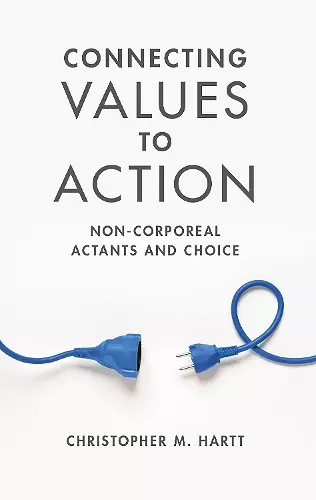Connecting Values to Action
Non-Corporeal Actants and Choice
Format:Hardback
Publisher:Emerald Publishing Limited
Published:26th Aug '19
Should be back in stock very soon

Why do we make the decisions we do? And how can we understand what influences our decisions? Non-Corporeal Actant Theory explores decisions and outcomes through the perspective of values, beliefs, ideas, and concepts - all integral parts of our everyday lives and the actor-networks that we take part in as decision-makers. Connecting Values to Action: Non-Corporeal Actants and Choice brings together a cast of expert contributors to delve into this theory and its ramifications for our lives. With chapters that analyze decisions made by death-defying free climbers, indigenous people facing the loss of their culture, and corporates responding to the #MeToo movement, editor Christopher M. Hartt examines how decisions are affected by the widening range of actor-networks that come with social media and technological development. For anyone struggling to understand how a decision is made, Connecting Values to Action offers a pathway to finding the causes of that decision. Exploring the role of non-corporeal actants on the very real consequences of decisions, this is an unmissable book for students and researchers of management and decision-making.
This book examines the tensions between two theoretical perspectives in the context of non-corporeal actant theory: actor-network theory and critical sensemaking theory. It applies non-corporeal actant theory to various contexts, addressing the impact of actor-networks actor-network theory in the context of indigenous heritage; the failed attempt of Wolfgang Langewiesche in the history writing project at Pan American Airways; the presentation of history in budget making; the analogy of management research as a dance; non-corporeal connections in the context of a seal hunt, using the story-act approach to clarify connections to non-corporeal actants; the use of actor-network theory and the concept of a non-corporeal actant as alternatives for understanding the processes of institutionalization and translation, using the example of meritocracy, its development within American business education, and it spread to Indian business education; the role of social media in the changing of corporate values, focusing on #MeToo and Time's Up; controversy as a non-corporeal actant in the community of management historians; the role of the social in extreme moments of existential awareness; the concept of the non-corporeal actant from the perspective of philosophy; how history uses actor-network theory as a method, how ideas from the theory relate to historiography, and how history could be non-corporeal and an actor in the manner of actor-network theory; and controversies in non-corporeal actant theory. -- Annotation ©2019 * (protoview.com) *
ISBN: 9781789733082
Dimensions: unknown
Weight: 554g
216 pages